Selkirk players in the 2019-20 Border Individual Chess Championship
Like last year, this year's BICC is being played in two sections, and Selkirk is well-represented in both of them, with entries from no fewer than 8 players from the Town Arms. The premier section comprises:
- Martin Wallace: Gala: 1751
- Stasys Gimbutis: NHS: 1614
- Ian Whittaker: Gala: 1557
- Dave Bogle: Selkirk: 1518
- Nick Duffell: Selkirk: 1451
- John Moore: Selkirk: 1418
The minor section has the players:
- Martin Keen: Selkirk: 1396
- Ian Thompson: Selkirk: 1322
- John Mitchell: Selkirk: 1265
- Steve Leckie: Selkirk: 1180
- Steve Litster: NHS: 1175
- Keith Robinson: Gala: 1173
- Alistair Gray: Gala: 891
- Kevin Poulton: Selkirk: 862
- Logan Symons: NHS: 826
- David Murray: Gala: 541
Main points from AGM, Oct 2019
No change in subs, either to Chess Scotland or to Borders League
- All teams are up to date with their payments
- Balance is well in the black
- Chess Scotland grading fees remain the same, and will be £96 for the league this season
- Graded friendlies are £1.50 each for grading
Office bearers remain the same, with the exception of Vice-Chairman, who is now John Moore
- Chairman: Martin Keen
- Vice-chairman: John Moore
- Secretary: Alan Armstrong
- Treasurer: John Moore
- Area grader: Alan Armstrong
Violation of League rules
- Playing out of grading order: deduct 2 from board count, but not from match points
- Ungraded players: must be played according to their strength
- Non-appearance of player: All lower players must move up if the non-appearance is expected; otherwise default on that board
Team composition: 4-player teams
- Board 1 for team can only play for that team (where club has more than one team); other players flexible
15 Oct 2019: Friendly lightning night
Be prepared for a lot of fun - and some bad chess - this Tuesday 15th October. It's time for the Selkirk Chess Club lightning tournament.
Lightning is a form of speed chess that you hardly see at all these days, as it seems to have been almost completely replaced by blitz (5 minutes for all the moves, for example). Lightning does not use clocks but an electric buzzer which buzzes every 10 seconds, and the rules are simple: you must move on the buzzer - neither before nor after. It is not easy the first time you try it, and there are certain to be some disasters, but it is not a serious night.
Any tips? First of all, please remember that you must move on the buzzer. You cannot get in a panic and say "Oh, just give me another 2 seconds" as that buzzer will sound relentlessly every 10 seconds, and so you will be stealing time from your opponent. One technique is to have some sort of half-decent (or at least non-disastrous) move in your head straight away, and only change your mind if you see something better in the 10 seconds allowed. For example, in the opening you might decide to castle if no other move comes to mind. Other times there are usually inoffensive little pawn moves that can be made in default of anything better jumping out at you.
Yes there will be disasters - but it's not too serious
PS There's nothing to stop you and your first opponent having a little practice before your real game. That buzzer will sound all night, so why not agree with your opponent that you'll play half a dozen moves for practice, and then reset the pieces after a few moves and then start the real game? Or even spend a minute or so watching another game to see how it works.
05 Aug 2019: Max Turner at the British Championships
An excellent performance from Berwick's Max Turner at the 2019 Major Open has seen him qualify for the main Championship in 2020: a huge achievement. Max shared second place with one other player on 6½ / 9, losing only to tournament winner IM Brandon Clarke (graded 2433) after giving him a very tough game. Max's tournament performance was around 2200. Here are some episodes from his games:
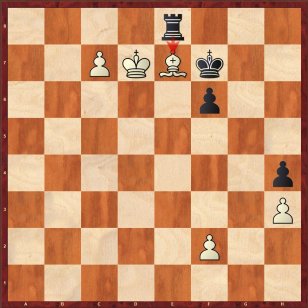
The 3rd round game against Matthew Payne of Worthing (2168).
For most of the game, Max was the exchange down for a pawn, but in compensation had excellent minor piece play, while Black's rooks never managed to coordinate properly at all.
A passed pawn decides the game: Max played 58. Bd8 and it's all over.
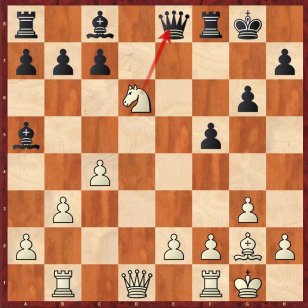
This is the 8th round game, with Southampton's Mark Cleary (2023) being Black.
Black has gone astray with a miscalculated sequence. In the resulting position Max has taken the d6 pawn; Mark tried 18...Qe7; but 19. Nxc8 (with 19. Qd5+ to follow) finished the game there and then
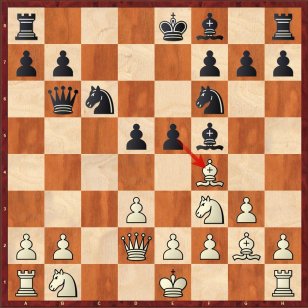
The final round game against Adam Taylor (2168).
Max was Black, and it was a fantastic game. The pawn thrust 8...e5 wins a knight for two pawns after 9. Nxe5 Bb4 10. Nc3 d4 - but Taylor conjured up a counter-attack with his central pawns, and for a time it was Max who was under the greater pressure. But he himself generated counter-threats, and the game ended in a hard-fought draw.
You can play through the whole of this game (well worth it) on our matches page.
21 Oct 2018: Borders AGM
Please note: what I have written here is not official - but only my impressions of the AGM. I may have misunderstood a point or two, or some things might change. In any case here is the AGM in brief:
- The League will be contested by teams of 4, rather than teams of 5
- Selkirk will enter two teams this year
- NHS will play their home teams on Wednesdays. The venue / day of NHS away games will be decided by mutual agreement between the captains, but the final say will be with the home team
- The League Secretary will look into splitting the Individual Championship into two sections by grade; this will hopefully encourage lower-graded to enter their section.
This will be a very interesting season, and we'll be looking forward to seeing the fixture list in the coming weeks.
01 Oct 2018: Three disasters
Playing for a team for the first time can be a daunting thing, and everyone worries about losing in a few minutes and (unjustifiably) feeling a bit of a fool. The truth is that there's nothing too much to panic about:
- There are are no spectators at Borders League matches, let alone TV cameras waiting to put you on The World's Craziest Fools or whatever
- We've all done it - time and time and time again
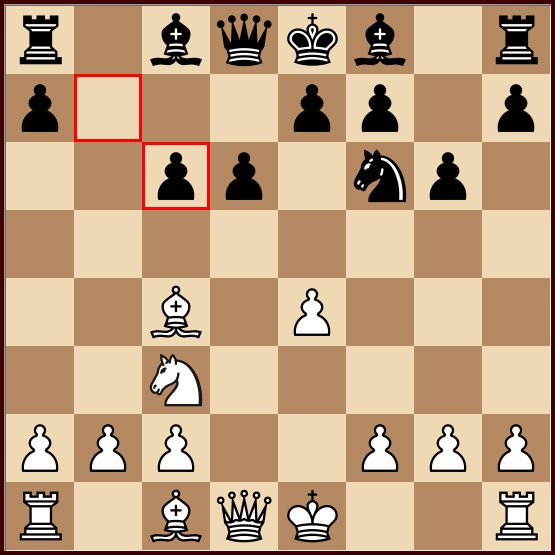
Waugh v Bogle 1965. I've carelessly allowed this position, and Bob finished the game with 8.e5! dxe5 9.Bxf7+, and my Queen is lost.
General rule is: if you're playing the Sicilian and your opponent develops his Bishop on c4, just play ...e6 and avoid this trap. Never forgotten it after this disaster.
I was only 15, I suppose.
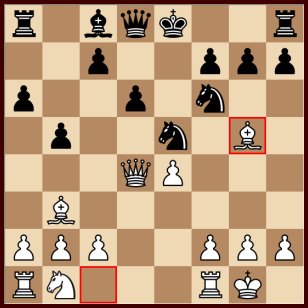
Bogle v Good, Borders Chess Congress 1994.
The Noah's Ark trap has been known for 150 years at least, and I myself had known it for years, making this totally unforgiveable. Black played 10... c5, and I couldn't stop a subsequent ...c4, trapping my Bishop.
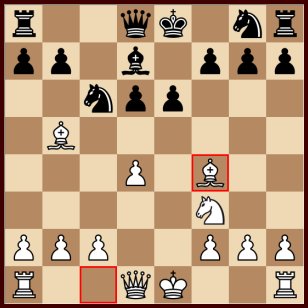
More nonsense - this time from the Borders League 2007. Against Alan Armstrong I have just played the dozy 8. Bf4 and walked straight into Alan's 8...Qa5+, winning my b5 bishop.
Only consolation was that it was in Kelso Legion and I had plenty of time to sit in the bar and wait for the other games to finish.
03 Sep 2018: The a7-g1 diagonal
A few weeks ago I won a quick friendly game as Black with a trick on the a7-g1 diagonal, and of course it's quite a useful diagonal to control as Black (or conversely a2-g8 as White). All the examples here show wins by Black: two by leading grandmasters of their time, and one from the Scottish National Chess League in 1992.
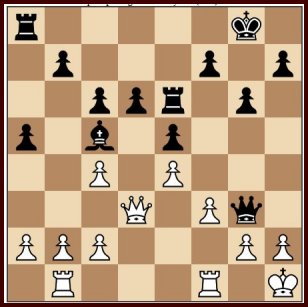
This is Delekta v Geller 1992. Geller has just played 18...Q(g5)xg3, capturing Delekta's knight, and that's where the game ended. If 19.hxg3, then 19...g5!! and White can do nothing against the threat of 20...Rh6 mate.
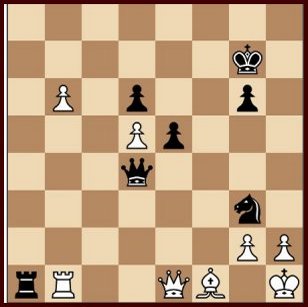
Karpov v Taimanov 1977. Taimanov had many achievements to his name - not least of all fathering twins when he was 78 years old - and here's one of his chess triumphs. He has just played 38...Ng3+ and Karpov resigned. If 39. Qxg3 then 39...Rxb1 just wins easily; but the real point comes after 39. hxg3. Then Taimanov would have played 39...Ra8!! threatening unstoppable mate after 40...Rh8. A maximummer-type finish!
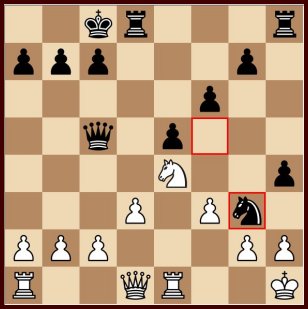
Less august company this time. It's McEwan v Bogle 1992 and here my check 21...Ng3 has won the game. 22. hxg3 obviously walks into 22...hg mate, while if 22. Nxg3 hxg3 23 h3, simply 23...Qf2 is deadly.
31 July 2018: A proposition
The offers you get when you're the editor of a chess website! Here's Sevgi, from Russia:
I am a woman, who believe in a destiny with a cheerful future for myself and that you could become a part of it. I do want to be next to a loving man. I wish to find a man that can give me a real hope and love! Hope you're interested in becoming a part of my adventure and will reply back soon!
Your true soul,Sevgi.
I think I'm sound there, eh? I always knew my articles on Averbakh and Stein would bring the women in!
30 July 2018: Town Arms tomorrow Tuesday 31st
As usual on Tuesday nights, the Town Arms is the place to be:
free chess, lovely bar staff, free beer and good company too. See you
there!
30 July 2018: Gilles Andruet: 1958 - 1995
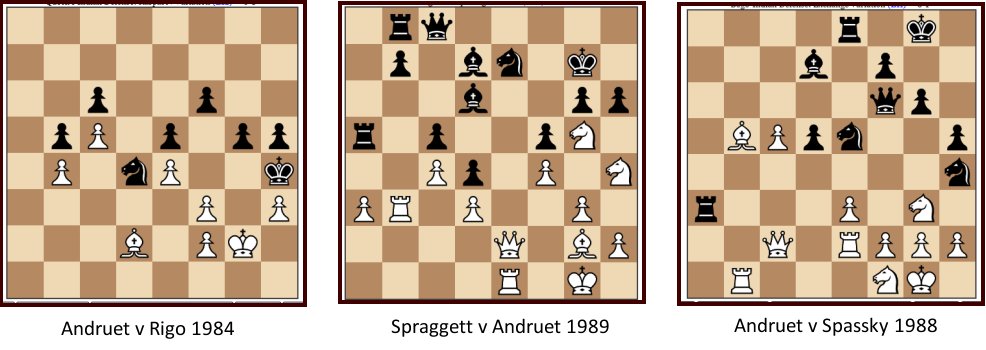
Gilles Andruet was an imaginative International Master from France who never quite achieved Grandmaster standard. Apart from chess, there was another side to his life (he was an obsessive gambler) and in 1995 he was murdered under circumstances which have never been fully cleared up - despite the arrests of three men and two criminal trials. The anniversary of his death falls on 22 August.
It might seem a bit mean to give three positions which Andruet lost to sacrifices - but we'll even things up next time by publishing three brilliancies from his own play.
In the first, Rigo wins neatly by 47...Nxf3! After 48. Kxf3, White's King, f-pawn and bichop are all getting in each other's way and Black can play...Kxh3 and ...g4+, and a few moves later one of the pawns marches through.
In the second, Spragget burst through with 23.Qxe7+, and after 23...Bxe7 24.Rxe7 Black cannot survive against the Rook + two Knights + a Bishop coming to d5. It is mate in a few moves.
The most spectacular sacrifice of 1988 came from Spassky (third positon): 19...Qf3!! and Andruet resigned, as after 30 gxf3 Ndxf3+ 31. Kh1 there comes 31...Bh3 and mate cannot be avoided. Pretty special from the ex World Champion.
16 July 2018: Leonid Stein: 1934-1973

The sudden and early death of Leonid Stein at the age of 38 was a huge shock to the world of chess - amd especially to Soviet chess. He won the Soviet Championship in 1963, 1965 and 1966/1967, and only narrowly missed out on three Candidates torunaments - two of them as there was a limit on entrants from any one country, which of course affected the USSR more than others.
Here is a mind-boggling finish from a game against Svetozar Gligoric, which you can play through at http://www.chessgames.com/perl/chessgame?gid=1282672
In the first diagram, both White and Black have strong connected passed pawns. Stein was playing Black, and coolly sacrificed his rook with 48...e3 49 Rxf8, knowing that White could not stop both pawns. The d-pawn did indeed queen, and in diagram 2 Stein's new queen has her eyes on (a) the White king (b) the White pawns and (c) the Black e-pawn. The White rook looks more impressive than it really is.
Fast forward a few moves (diagram 3) and White tried one last trick: 56. Rh8+, but after 56...Kg6!! 57 Rg8+ Kh5, White has run out of checks and cannot defend against Black's threats. 0-1. Fantastic play by Stein.
29 June 2018: Yuri averbakh
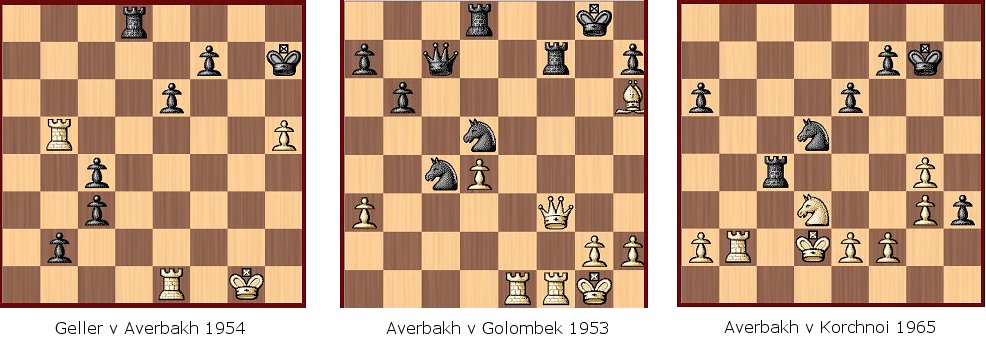
Yuri Averbakh is 96 years old, and is the oldest grandmaster in the world. He has been a grandmaster since 1952. In addition to his playing honours (Soviet Champion 1954, Candidate in World Championship cycle 1953 etc etc) he is an International Arbiter; an International judge of chess compositions; a renowned author and chess journalist; and a leading endgame theoretician with many publications to his credit - including the monumental 5-volume work Comprehensive Chess Endings.
Here are three episodes from his games.
In the first game, Averbakh is a rook down, but has three dangerous passed pawns. It looks as if White's rooks can hold the pawns, but Averbakh played 46...Rd1!! and with this gain of tempo Black ends up with a queen against rook in all variations.
In the secomd game, Averbakh is playing three times British Champion (and WWII code breaker) Harry Golombek. Averbakh had played 29 f7+ and Golombek had resigned; but if Black had taken the f7 pawn with his rook (diagram) then he would have been hit with 30. Qd5!! The queen cannot be taken on account of 31 Re8 and mate next move, and in the meantime the threat of 31.Rxf7 is a killer.
Great player that he was in his heyday, Averbakh did not always get it his own way. In the third diagram, Viktor Korchnoi came up with the stunning 39...Rc1!!, and whatever White does, the h-pawn marches through to queen. All great stuff from the 1950 and 1960s
PS How to pronounce Yuri Averbakh. z-others/averbakh-pronunciation.mp3
21 June 2018: World Cup and stalemates

The club tends to be quiet over the summer, but there were three of us in the Town Arms on Tuesday night, and after watching the Russia-Egypt World Cup match we went upstairs and had a mini-blitz tournament for the last hour and a half. Very enjoyable it was too. Perhaps some more people will turn up next week (and more after the World Cup's done).
The first two positions this week come from a very entertaining article by Judit Polgar in the latest New in Chess magazine. The article is about time trouble, and in the first position no less a player than Karpov blundered with 75. Qf3??, giving stalemate. Now if you're wondering why anyone would play on while Q + B down against Karpov, the answer is that it was a rapid game without increments where Karpov was seriously short of time, and his opponent was hoping for a miracle. It happened.
A similar scenario in the second position, where in a blitz game Kiril Georgiev played on Q + B down against Garry Kasparov, hoping for flagfall. GK played 78. Qc5??, and Georgiev escaped with a draw by stalemate. Even the best can blunder under time pressure.
While we're on stalemates, here's a bit of nonsense I found from the 5th American Chess Congress in 1880: Congdon v Delmar (position 3). This game should have been put to bed by Black about 15 moves before, but we join it after Black has failed to find 43...Qa1+, and instead has played 43...Qc3?? (the queen had been on d4). White replied with 44.Qg8+!, and after 44...Kxg8, it is stalemate.. Oh dear.
16 June 2018:a weekend of anniversaries
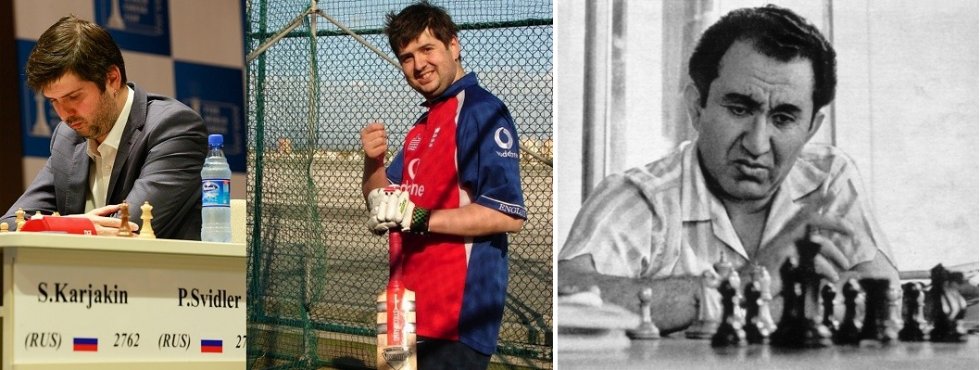
It's a weekend of anniversaries in the chess world, and 17 March sees birthdays for Alexander Motylev (1979), Peter Svidler (1976) and Peter Horvath (1972) among others.
It was also the birthday of Tigran Petrosian, who was born on 17 March 1929. Petrosian held the world title for 6 years after defeating Botvinnik in 1963 and then retaining it against Boris Spassky's 1966 challenge. Alas, three years later the "Iron Tiger" was to have his 40th birthday spoiled; Spassky had returned as challenger in 1969, and on 17 March of that year took the title 12½-10½. Petrosian died in 1984.
Peter Svidler has won the Russian Championship no less than 8 times, and is currently ranked no 16 in the world. He also runs – and plays for - the St Petersburg team The Bronze Horseman which in May 2018 won the Russian Team Championships for the third time.
A noted Anglophile and cricket-lover, Peter is an excellent speaker of English and is one of the best chess commentators out there. Happy 42nd, Peter!